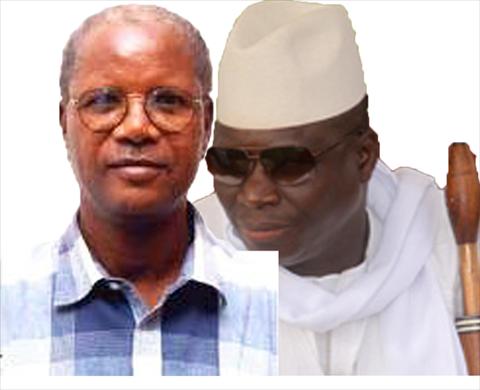
(JollofNews) – As Gambians gear up to celebrate the 20th anniversary of the July 22nd ‘Revolution’, it is incumbent upon all of us to reflect on what it has meant to us and whether or not all or any of the lofty promises made by its architects have been realized. Are a majority of Gambians better off in the ‘Revolution’ or are they nostalgic for the ‘good old days’?
When Yahya Jammeh first came to power in a military coup back in1994, hardly anyone gave both him and his Armed Forces Provisional Ruling Council (AFPRC) any chance of survival for any length of time, let alone assume leadership of this country for 20 years. But survive he did and he successfully transformed himself into a politician who has so far contested and won four successive presidential elections. This is despite the fact that while he was chairman of the AFPRC, he not only said he would never be a politician, but heaped all kinds of invectives on politicians. Therefore, no one in their right frame of mind would have thought that 20 years later, Yahya would still remain as this country’s top politician with no visible intentions of ever leaving the State House.
We can also vividly remember that in one of his first policy speeches as chairman of the AFPRC, he not only vehemently criticized former President Sir Dawda Jawara for staying too long in power, but he also promised that henceforth, no head of state would be allowed to serve for more than two five-year terms. He in fact said 10 years was even too long for anyone to stay in power.
However, here we are 20 years later, and Yahya is still head of state and there are no indications that he has any intentions of ever voluntarily stepping down or even loosening his iron-grip control of the electoral system to level the political playing field in order to allow his opponents any chances at the polls.
Can we therefore say that like all other sit-tight African leaders, President Jammeh has become so intoxicated with power that he has forgotten all the promises he ever made regarding the need for regular leadership changes at the top? He is today one of a small club of sit-tight heads of state in Africa which include Teodoro Obiang Nguema of Equatorial Guinea (1979), Jose Eduardo dos Santos of Angola (1979), Robert Mugabe of Zimbabwe (1980), Paul Biya of Cameroon (1982), Yoweri Museveni of Uganda (1986), Blaise Compaore of Burkina Faso (1987), Omar al Bashir of Sudan (1989), Idriss Deby of Chad (1990) and Isaias Afewerki of Eritrea (1993)], and that is definitely not a club anyone should be proud of being associated with.
“Why should anyone change a winning horse?”, so goes the popular adage, but while President Jammeh may indeed be winning elections (whose freeness and fairness are highly questionable), but is the Gambia as a nation winning anything from the prevailing scenario? It certainly appears not. The Gambia today has been transformed from one of the most admired nations in Africa for its style of governance and adherence to democracy to being just another pariah state where the rule of law and respect for human rights have been thrown to the back burner and everything revolves around one man; President Jammeh and where arbitrariness has become the order of the day. A good example of such arbitrariness was the unpopular decision he presumably single-handedly took to deny the late Bubacarr Baldeh’s body to be buried in his home town of Mansajang after he died in self-imposed exile in Senegal. This action is not only a national embarrassment of international proportion, but it also goes against the very grain of our norms and values as a God-fearing society.
It is now quite evident from all indications that the Gambia is fast sliding down the governance ladder, no doubt orchestrated by such retrogressive ideas like the cult syndrome being built around President Jammeh’s personality by his many sycophants and praise singers. A good case in point had been the recent resurgence of the campaign by some of his cronies to have him crowned as king. It is however quite a shame that this time round, the calls are coming from our own members of parliament who are expected to be more conversant with the law. It therefore shows that the Gambia has still got a very long way to go in order to reach the Promised Land if our own law makers would conceive such retrogressive ideas which go against the very grain of the constitution they are supposed to be the guardians.
To some people however, this unholy campaign is an apparent acknowledgement by his own supporters that he has no intention of ever relinquishing power and therefore crowning him king would tantamount to be a de facto formalization of the existing reality. But the very fact that neither President Jammeh himself nor any other member of the regime has publicly dismissed such a retrogressive campaign seems to indicate that the idea could be acceptable to him. However, there is absolutely no doubt that even though most Gambians are politically naive and living in perpetual fear, but it is hard to imagine how any amount of cajoling and bamboozling can make a majority of them ever endorse such a backward idea in a referendum.
The Lust for Power
Those of us old enough can still recall that when the AFPRC junta first seized power in 1994, one of their first actions was to renounce extravagance and the flamboyant lifestyle of the former regime, and they even had to sell off all the luxury cars they inherited and allocated their ministers with less expensive vehicles. They went on to coin their famous slogan; “Transparency, Accountability, Probity and Good Governance” which seems to have now completely lost both its meaning and relevance as neither of those attributes any longer hold water. Therefore, as the khaki boys and their enablers settled down and became intoxicated with the trappings of power, they reverted to even more extravagant lifestyles than their predecessors. We have seen, for instance, how President Jammeh and all his ministers not only now ride on expensive luxury cars and live flamboyant lifestyles, but unlike former President Jawara who used to travel by commercial flight, President Jammeh has also acquired a presidential jet (apparently more than one), no doubt costing the Gambian tax payers millions of Dalasis in maintenance and upkeep.
It was indeed quite early during the transition that President Jammeh and his colleagues in the AFPRC manifested their lust for power. They used their absolute control of the state machinery to create the July 22 Movement and used it as a tool to consolidate their grip on power as well as prepare the ground to eventually hand power over to themselves instead. It was quite obvious that all their actions and pronouncements, including the suppression of all voices of dissent and the encouragement of the so called ‘no election’ campaigners, were orchestrated and geared towards handing over to themselves rather than to the civilians in whose name they claimed to have staged the coup.
We can all recall that as we approached the end of the transition period, the very first thing the junta did was to doctor the draft constitution in order to pave the way for then Chairman Jammeh to contest the presidential elections. To achieve that, they had to remove or modify certain clauses from the draft constitution before submitting it to the people in a referendum. Those clauses included the minimum age limit of a presidential candidate, which, due to a popular demand, was put at 40 years, but which would have disqualified Yahya Jammeh. They also had to remove the popularly-acclaimed two-term limit from the draft constitution to allow him to remain in power as long as he wished, thus making the Gambia among the odd ones out in the entire West Africa region where most of the countries have now instituted a two-term limit.
All that was clear indication that Yahya Jammeh had always harboured the intention of remaining in power for ever, despite all the pronouncements during the transition that he was not a politician and that he had never intended to be one.
To further consolidate his grip on power, President Jammeh continues to use the rubber-stamp National Assembly to subject the constitution to frequent changes, including a repeal of Section 48 which called for a second round of a presidential run-off vote if any candidate fails to get more than 50 per cent of the vote in the first round. That he had to urgently do after the 2001 presidential elections when he apparently realized that despite all the intimidation and other high-handed tactics against the opposition, he received only 56 per cent of the vote, and no doubt fearing that he could be forced to a second round in subsequent elections.
Meanwhile, the regime has continuously flatly refused to accede to quite genuine opposition demands for electoral reforms when it is quite obvious that under the present system where President Jammeh reserves the absolute power to appoint and sack members of the Independent Electoral Commission (IEC) as well as virtually controls all aspects of the electoral system, it is neigh impossible to hold free and fair elections under such a climate. We have seen for instance how the present chairman of the IEC has continued to illegally cling on to the position against the provisions of the law, apparently because he is assured of President Jammeh’s support and backing. We have also seen how the entire state machinery had often been mobilized and senior members of the civil service compelled to openly support him during elections.
Therefore, under such a climate where the president seems to assume so much power and authority, and the executive being in almost complete control of all aspects of life in this country, it is hard to see how we can ever get out of this quagmire of arbitrariness. For instance, as the rest of Africa moves forward in strengthening their institutions of governance, we in this country seem to be moving on the opposite direction, with all our oversight institutions virtually now behaving like appendixes of the ruling party, manned by people whose sole objective is to always appease the president rather than satisfy the wishes and aspirations of the people they are supposed to serve.
Of course, such an attitude from those heading such institutions can be perfectly understood because they have no security of tenure, especially considering the frequency of their hiring and firing. It is now quite apparent that the president has assumed the absolute power to hire and fire all public servants without going through any due process as would be expected in any democracy. Therefore, all those who want to keep their jobs have no alternative but to do everything within their means to be in his good books and continuously behave like zombies.
Lack of Political Will
The lack of political will by the Gambian authorities to play by the rules of the game is very much in evidence. We have recently heard, for instance, how the Malawi Supreme Court had to annul an edict issued by President Joyce Banda to nullify their election results because of allegations of widespread fraud, and how she had to eventually gracefully concede defeat to her bitterest opponent Peter Mutharika, after the results were announced. It would be hard for anyone in his/her right frame of mind to imagine that any judge in the present dispensation in the Gambia would muster the courage to annul any such edict issued by President Jammeh or that he will ever concede defeat under such a climate, considering that he alone has the powers to appoint all the judges as well as the chairman and other commissioners of the IEC.
Therefore, comparing the situation in the Gambia with what goes on within the sub-region; one cannot fail to see how this country has continued to tumble down the governance ladder with an unprecedented speed. Recently, for instance, we have witnessed Bissau Guineans residing in the Gambia registering and voting in their country’s last presidential elections. If Guinea Bissau can do it, why not the Gambia, one would tend to ask. It is certainly yet another clear indication that our leaders lack the political will to empower the Gambian Diaspora, apparently because they are convinced that a majority of them will vote against the APRC. Therefore, the decision not to enfranchise the Gambian Diaspora is a political decision rather than economic because we all know that the Gambia has a much better economic clout than Guinea Bissau and some of the other countries that have been empowering their citizens in the Diaspora. One would therefore tend to question the sincerity of all that noise about transforming the Gambia into “an economic super power and the Dubai of Africa” within the next five years when even less endowed countries like Guinea Bissau are performing much more impressively when it comes to empowerment of their citizens.
Therefore, the very fact that President Jammeh, being the second longest serving head of state in West Africa and the 11th in the whole of Africa, has still not been elected chairman of ECOWAS or the African Union, tells quite a lot about how his governance record is being perceived even by his own sub-regional colleagues and the rest of the international community.
Unfulfilled Promises
Recently, one critic of the regime reminded us of the numerous remarks and unfulfilled promises attributed to President Jammeh since he assumed office in 1994, quoting some of them as: “The Gambia will be the super-power of development, and that is why I am a dictator of development”. “In a few years, the Gambia will be Africa’s silicon valley”. “The Gambia will be the Dubai of Africa in the next five years”. “The Gambia will soon join the group of donor countries”. “Power failure will soon be a thing of the past”. “For my government, the sky is the limit”. “By 2016, the Gambia will not only be food self-sufficient, we will export to other countries, under Vision 2016”, etc. etc.
The critic however forgot to mention the ridiculous promise of constructing a railway line right round the country when even the ferry services between Banjul and Barra have become far worse than when we had the wooden ferries in the 1950s and 60s. We can also recall in February 2004 how he caused so much euphoria when he made an impromptu nation-wide television broadcast about the discovery of oil in the country, brandishing a CD and giving everyone the impression that it was just a matter of weeks before the oil started flowing, and promising Gambians that they would soon become rich and the country eventually transformed from an aid recipient to an aid donor. However, more than 10 years later, there is still no indication that such oil even exists, let alone begins to benefit Gambians. We have for instance, seen how Ghana, which announced its oil discovery only in 2007, has now begun pumping that oil in commercial quantities, barely three years after, and yet they never made half as much fuss about the discovery as we did.
We have also long been privy to the cacophony of noises being made by the regime and its sycophants about its Vision 2020 pipe dream which aims “To transform The Gambia into a financial centre, a tourist paradise, a trading, export-oriented agricultural and manufacturing nation, thriving on free market policies and a vibrant private sector, sustained by a well-educated, trained, skilled, healthy, self-reliant and enterprising population and guaranteeing a well-balanced eco- system and a decent standard of living for one and all under a system of government based on the consent of the citizenry”. However, despite the fact that we have less than six years to go before the advent of 2020, with hardly anything to show for it, the regime is instead now ironically talking about Vision 2016 “when the Gambia will not only be food self-sufficient, but will export to other countries.” This is indeed the joke of the century.
Meanwhile, with all those lofty promises, life in this country is by all accounts much harder today than it had ever been under the previous regime. Not only are the people’s living conditions much worse than they had ever been, but most of the social infrastructure inherited from the previous regime has virtually crumbled. For instance, those in the country-side have virtually been cut off from Banjul and its environs, especially when the road network has been rendered unusable in many parts of the country, particularly during the rainy season, and the public transport system we used to know under the previous government brought to its knees by mismanagement and bad policies. Even the Gambia Radio and Television Services (GRTS) which the people up-country depended to connect them with the rest of the country is now hardly available in many parts of the country, thus cutting off the rest of the countryside from what goes on from the seat of government.
It is indeed a shame that in this age of the internet, when the whole world is inter-connected, most Gambians are still denied access to the most basic communication tool – the radio, and as a result, a majority of those up country now depend entirely on radio stations from neighbouring Senegal and anything else they can lay their hands on, for information, most of which is hardly relevant to them. This is also no doubt why there is a proliferation of online radios by Diaspora Gambians, apparently to fill the void created by the lack of attention given to the public media at home, which have virtually been transformed into propaganda tools of the ruling APRC.
To add salt to the injury, the regime has also been accused of blocking access to such cheap internet communication facilities like viber, thus making Gambians even more isolated from the rest of the world.
Cult Syndrome
It has now become a tradition to give the credit to President Jammeh for every good thing realized in the country while others are made scapegoats for anything that goes wrong. There is a tendency to not only treat him as infallible but also as super human who has the answer to all the country’s problems. We have for instance seen how this cult syndrome is being played around him with the claim that he possessed some super natural powers such as the power to fight against hostile demons in order to construct bridges, thus earning himself the title of ‘Babili Mansa’ (the king who bridges the river). He also claims to have the power to cure several ‘incurable’ diseases including HIV/AIDS and infertility.
As part of efforts to sustain this mantra of a cult syndrome, most people in this country have now been reduced to praise singers, apparently in order to gain access to the numerous bounties being frequently dished out by President Jammeh in the form of cash or material gifts. As a result, therefore, those people we expect to speak against some of the bad decisions and actions attributed to his regime like our religious and opinion leaders, seem to have been completely pacified by those generous gifts he dishes out to them that they would rather sing his praises than tell him the truth. We have seen how the very few of them who have had the courage to speak out against some of the bad actions of the regime and other ills of the society, such as Ba Kawsu Fofana and Baba Leigh, have paid dearly for it, with both of them being subjected to intimidation and harassment and eventually forced into self-imposed exile, while their colleagues in the Supreme Islamic Council have not even mustered the courage to speak in their defence. Yet, when President Jammeh ordered the execution of the nine death row prisoners in August 2012, against widespread international condemnation, most of those same religious leaders were quick to defend it as an Islamic injunction. It clearly shows how most of them would do anything to please President Jammeh rather than risk earning his wrath and ending up like Imams Fofana and Leigh. We even recently saw one religious scholar being quoted calling for opponents of the leadership or advocates for a multi-party democracy to be gotten rid of; “…it is justified to get rid of all the opponents of government even… because that is what God ordains” and “Whoever is calling for a multi-party system should be ostracised,” (The Standard – 10/06/2014).
Therefore, in view of the total submissiveness of senior government officials and those in positions of authority, President Jammeh has almost completely been shielded away from what goes on in the society and as such, he is hardly aware of the daily realities on the ground. Despite that however, everything seems to be done in his name by those very people he entrusts with the running of our institutions of governance, and instead of telling him the reality, they would just tell him what would please him. As a result therefore, the situation continues to deteriorate and with it the quality of life of ordinary Gambians is getting worse by the day.
There is also a resurgence of superstition in the country, with apparent government connivance. For instance, we can still recall with shame and embarrassment the state-sanctioned exorcism exercise conducted a few years ago by so called ‘witch-hunters’ escorted by heavily armed members of the security forces, during which several innocent Gambians were subjected to all sorts of harassment and indignities after they were accused of practising witchcraft, thus taking us back to the dark ages. We recall how Halifa Sallah, the only opposition leader who mustered the courage to stand up against the shameful act, was arrested and detained and eventually charged with opposing the government policy of exorcism, thus further making the Gambia the laughing stock of the sub-region.
Penchant for Cheap Popularity
As mentioned earlier, one despicable aspect of President Jammeh’s administration is the extravagant lifestyle associated with it and his own open display of wealth. In addition to the frequent gifts of large sums of money and other materials he often makes, he is also now the one who virtually ‘donates’ vehicles and other working tools to all the security forces as well as other government departments, in addition to private individuals and organizations. This is no doubt why several musicians and other artists, as well as other shadowy individuals and groups from across the sub-region and beyond, are now frequent visitors to the Gambia, composing songs in his praise, as well as awarding him dubious medals and accolades, no doubt receiving large sums of money from him in return.
We have for instance recently witnessed the gift of 12 vehicles to the government of Guinea Bissau, despite the fact that there is an acute shortage of ambulances up-country as well as the frequent excuses of lack of transport given by the police when they are called to scenes of crime. This is what the Mandinkas call “sibijang dubengho” (the shadow of the tall palm-tree; hardly benefitting those near the tree).
It is also hard for anyone to justify the millions of Dalasis being spent on composing songs, writing poems and other trivialities just to eulogize President Jammeh as part of celebrations marking the 20th anniversary of the July 22 ‘Revolution’ when such money could have been spent on other more beneficial causes.
If indeed President Jammeh has any more regard for his regime’s original sing-song of ‘transparency, accountability and probity’, he has the obligation to tell Gambians where he gets all the money he uses to buy such cheap popularity, which seems to make him far much richer than even the state. It is quite obvious that his monthly salary, as well as his numerous business interests including the coerced ‘free’ labour that he quite often gets from Gambians on his numerous farms across the country, are far from sufficient to earn him all that money and wealth he openly displays. This therefore means that he has other means of income which he is constitutionally obliged to disclose.
A few years ago, for instance, we had witnessed how President Jammeh’s penchant for awards and accolades had caused some embarrassing situations which tended to further make our country the laughing stock in the international arena. A good case in point had been when it was claimed that he had received the ‘Presidential Champions Platinum Award’ from President Barack Obama, which later turned out to be a fake, no doubt orchestrated by some smart people bent on making some quick bucks from him, knowing how much he loves such titles. Even the very fact that Barack Obama’s name was spelt in the award with a double ‘R’, and presented without the involvement of the American embassy, was enough indication that it was fake.
We can also recall that during that same elaborate ceremony in Kanilai where the ‘Obama award’ was presented to him by a shadowy organization called the International Parliament for Safety and Peace based in Palermo, Sicily, he was also made ‘Honorary Admiral in the Great Navy of the State of Nebraska’, which later turned out to be a tongue-in-cheek joke as Nebraska is a landlocked state which does not have a navy.
Therefore, with already an unprecedented long chain of names and titles, one would wonder what more His Excellency President Sheikh Professor Alhaji Dr. Yahya Abdul Aziz Jemus Junkung Jammeh, Nasirul Deen, still wanted that he would embarrass himself and the country in accepting such fake accolades.
There is also no doubt that the despicable practise of throwing biscuits from his fast moving motorcade to the down-trodden Gambian children on the side-walks, which has so far caused many fatal accidents, is no doubt all part of that penchant for cheap popularity. It is indeed quite hard for any reasonable person to imagine why he would not send that biscuit to the schools and other centres where it would be distributed to the children rather than throwing it at them like destitute refugees.
This penchant for cheap popularity has also greatly contributed in making this regime the greatest enemy of press freedom in the sub-region. Those journalists who insist on doing their work according to the dictates of their profession rather than sing praises of the regime are often seen as enemies and as such, they risk being frequently harassed or even having their media outlets arbitrarily closed down. For instance, we have witnessed the frequent arbitrary closures of some media houses simply for not bowing down to the pressure of singing praises of the regime but to instead carry out their obligations to the voiceless Gambians. Among the notable casualties in the past were Citizen FM, Sud FM, The Independent, and most recently, Teranga FM, the only private radio station in the country (after Citizen FM and Sud FM) which not only had its own news programmes, but which also opened its airwaves to the opposition and those who are denied access to the socalled public media. Which action was no doubt aimed at denying President Jammeh’s opponents virtually the only avenue which was still open to them to talk directly to the people.
In addition to Teranga FM, we also saw how two of the most vocal newspapers; The Standard and the Daily News were verbally ordered to close down without any court order or any legal document from the relevant authorities, which clearly demonstrates the arbitrary nature of governance in this country and the total lack of regard for the rule of law. Even though Teranga FM and The Standard were eventually ‘allowed’ to resume operations, but the Daily News is still ‘banned’, apparently because it continued publishing online after the ‘ban’. It is therefore hard to imagine in this day and age how any government would behave in such an arbitrary manner when there exist laws to adequately address such issues. In the process, those responsible did not even seem to care about the welfare of the numerous Gambians they had rendered destitute by closing down their only means of earning a living.
There was also the case of the two journalists who were detained and subjected to intimidation and harassment and eventually charged with “inciting violence”, “conspiracy to commit felony” and “seditious intention”, merely for applying for a permit to hold a peaceful demonstration in the wake of the execution of the nine death row prisoners. They were apparently only let go when President Jammeh, no doubt under intense pressure, ordered for the charges to be dropped, when he realized that the case would cause more harm than good to the already tarnished reputation of his regime.
This was however followed shortly after by the arrest and detention of another two journalists who are currently being prosecuted merely for reporting that some APRC militants had defected to the opposition UDP. This is despite the fact that the regime’s own mouth-piece; the Daily Observer is in the habit of frequently reporting questionable defections of opposition supporters to the APRC and yet no one has ever been arrested or prosecuted for it, clearly showing how the law is being selectively used (or abused) in present day Gambia.
With regards to impunity, it is almost 10 years since the murder of Deyda Hydara and eight years since the disappearance of Chief Ebrima Manneh, and yet, there is no indication that the Gambian authorities have any intentions of investigating who killed Deyda or what happened to Chief Manneh. Therefore, the recent ruling by the West African regional court, which imposed some costs on the Gambia government for failure to conduct a meaningful investigation into Deyda’s murder, was yet another indictment of the regime’s lack of respect for the rule of law. However, like in previous rulings of the court against the Gambia, it is very likely that the regime will again ignore it, which is yet another apparent indication of its lack of regard and respect for the very regional protocols it had acceded to.
As regards the socalled public broadcaster, the GRTS, which is financed and sustained by the Gambian taxpayers, having virtually been transformed into the mouth piece of the ruling APRC, most Gambians now seem to have lost confidence in whatever emanates from its broadcasts, but they instead depend mostly on foreign broadcasts for accurate news and information. This is no doubt why there is a proliferation of online radios and publications by Gambians in the Diaspora in order to fill the void created by the failure of the regime to allow the media at home to do their work without interference. It is however quite hard to see how President Jammeh and his advisers (if he has any), have failed to realize that such policies are achieving the very opposite of what they are intended for; which is to prevent Gambians from accessing veritable news and information. They are instead helping to nurture and popularize these online media and that no amount of censorship can prevent Gambians from reading or tuning to them. This is because if the media at home are being suppressed, then the people are left with no other choice but to resort to the online media for news and information and despite strenuous attempts to block them, people have still found means of circumventing those blockages.
This is yet another clear indication of how low democracy and common sense have degenerated in the Gambia when it is quite obvious that no country can achieve any meaningful development without such basic ingredients like a free press. We in fact don’t need to go very far to see how a free press contributes to development. Our neighbour, Senegal, is far ahead of the Gambia in almost every aspect, including political, economic and social development, thanks to allowing the media to do their work without undue interference from the authorities. Therefore, the Gambia will continue to remain at the bottom of the development index as long as the regime continues with its belligerent attitude towards the free press.
Poor Governance Environment
Gambian political analysts are still reeling from the conduct of the last presidential elections in 2011 when the entire government machinery was mobilized to campaign for President Jammeh and the ruling APRC, thus giving enough justification to the decision by ECOWAS and other genuine institutions to conclude that the process was not free and fair. Indeed it was hard to see how any other credible institution would have endorsed what happened to be anywhere near the minimum acceptable standards of a free and fair election.
We also witnessed the widespread intimidation and harassment of those who stood against the APRC in the subsequent National Assembly elections in 2012, after a majority of the opposition parties were squeezed out of the race by the failure of the IEC to entertain their genuine request to carry out the most basic electoral reforms necessary to allow a minimum level playing field. What we ended up with was yet another legislature composed of sycophants and praise singers, ever ready to sing praises of the executive and do exactly what would please President Jammeh like calling for him to be crowned king rather than highlighting the daily problems facing their constituents whom they claim to represent, thus further helping to transform the Gambia into the laughing stock of the sub-region and beyond.
While in all democratic countries, the legislature and the judiciary operate parallel with the executive, but in the Gambia, these two institutions have been transformed into playing second fiddle and are behaving more like subordinates of the executive. It is, for instance, only in the Gambia that the head of state still reserves the absolute power to appoint and sack the parliamentary speaker and his/her deputy as well as the Chief Justice and all judges and magistrates. Even the very fact that traditional chiefs, who also preside over district tribunals, can be appointed and sacked at will by the president without any involvement of the Chief Justice as head of the judiciary, shows how defective the system is. Obviously, such a scenario renders the heads of the two institutions quite impotent to operate independently, conscious of the fact that they owe their jobs to the head of state who can remove them anytime he chooses. That of course is quite reflected in the performance and operations of the two institutions, and virtually all other over-sight institutions in the country.
Indeed, it is even more evident with the IEC, when its chairman and all the commissioners are being appointed by President Jammeh, who also reserves the power to sack them. Under such a scenario therefore, it is nigh impossible for the commission to operate independently, with the members knowing full well that they can be removed whenever they did something that did not please the head of state, and we have seen that happen several times. That of course has been quite glaringly reflected in the way they conduct elections.
Therefore, it is not a surprise that the poor governance situation in the Gambia had been reflected in various international forums, including the 2013 report on human rights by the US State Department. “The most serious human rights problems in the country included government interference with the electoral process; government harassment and abuse of its critics; and torture, arrest, detention, and sometimes enforced disappearance of citizens. Government officials routinely used various methods of intimidation to retain power.
“Other reported human rights problems included poor prison conditions; denial of due process; prolonged pretrial and incommunicado detention; restrictions on privacy and freedoms of speech, press, and assembly; violence against women and girls, including female genital mutilation/cutting (FGM/C); forced child marriage; trafficking in persons; child prostitution; discrimination against lesbian, gay, bisexual, and transgender (LGBT) individuals; and child labor.”
We have also seen that according to the Freedom in the World 2014 report which evaluated the state of freedom in 195 countries and 14 territories globally, the Gambia has received a “downward trend arrow”, mainly “due to worsening restrictions on civil liberties”. These restrictions have been cited as to include the amendments to the Information and Communication Act and the Criminal Code Act that “further limited open and free private discussion, and a ban on the use of Skype and other voice communication programs in internet cafés.” Can you imagine the Gambia being placed in the same basket with failed states like Central African Republic and South Sudan? This shows how far down the ladder we have gone.
This deterioration in the human rights environment in the Gambia is no doubt why there have been growing calls amongst civil society activists across Africa to get the headquarters of the African Commission on Human and Peoples Rights relocated from Banjul to another African capital. They indeed have a point as it is quite paradoxical to have the continent’s top-most human rights body hosted by a country with such a dismal human rights record.
Another indictment of the prevailing governance system in the Gambia is no doubt the regime’s insistence on carrying on with an archaic electoral system, being the only country in the whole wide world still using marbles as ballots. It is indeed hard to justify why the Gambia, being the smallest country on the African mainland, should insist on hanging on to this old-fashioned system after other much bigger and more sophisticated countries have adopted much more transparent and equitable systems. Why can’t we follow best practice? Of course, it may quite well be serving the interest of the regime to continue to cling on to power forever and as such, there is no inclination to embrace positive change. It is however quite an embarrassment to most Gambians to be seen to be using this stone-age system of voting when everyone else is using the paper ballot or even electronic voting.
Another usual phenomenon of the prevailing governance system is the musical chairs syndrome resulting in the frequent sackings and re-instatements of civil servants and other public service employees, which has virtually transformed most of them into zombies who would only say and do what would satisfy President Jammeh rather than what is good for the country. Therefore, there is now a tendency to end up appointing less competent officials who hardly know their responsibilities, apparently based on ethnic, regional or other mundane factors rather than on their professionalism or academic qualifications. This is no doubt why most of the appointees now see themselves as serving President Jammeh instead of the Gambian people whose taxes pay their wages and salaries. We have seen for instance, how some of those appointees unashamedly write letters to President Jammeh thanking him for their appointment, behaving as if their salaries are paid from his pocket instead of from the national treasury.
Also, it is only in the Gambia that one would see top ranking security officers as well as other senior civil servants openly manifesting their loyalty and support to the ruling party, with military barracks and police stations, as well as other public institutions openly displaying ruling party posters and flags, and senior officers pinning President Jammeh’s badges on their chests, especially during election campaigns. We also saw how almost the entire fleet of government vehicles was commandeered to accompany the president’s campaign tour during the last presidential elections, with virtually all the senior officials, including the Secretary General and head of the civil service, unashamedly donning scarves and other political paraphernalia like party militants. We also saw how virtually the entire corps of senior officers of the security services accompanied President Jammeh on his campaign trail with the junior officers singing and dancing ahead of his convoys.
Another interesting aspect of the governance environment is how the military and other security apparatus seem to have become quite subservient to President Jammeh as an individual rather than to the state. We have seen, for instance, how the soldiers have become managers of President Jammeh’s businesses and other properties including his farms at Kanilai and other parts of the country. The situation is such that there is now hardly any distinction between working for President Jammeh’s business ventures and the state.
There is, for instance, this story about soldiers being seen frequently escorting President Jammeh’s large herd of cattle like herdsmen. One case in point is the story of one public official who complained how he had to spend more than 45 minutes in his car with several other motorists on both directions while the soldiers armed with guns had to stop the traffic on the main highway near Farato in order to allow President Jammeh’s herd of cattle to cross the road. Can anyone imagine such a scenario happening anywhere else in the civilized world? This is in addition to the practise of compelling civil servants and other state employees to frequently work on President Jammeh’s farms in the guise of voluntary labour when it is quite obvious that most of those people are often faced with a ‘Hobson’s Choice’; either do ‘voluntary’ labour or face the consequences.
Another indictment of the governance system in The Gambia is the frequent harassment and intimidation of militants and supporters of the opposition. Unlike in many other democracies, for instance, where opposition leaders are often issued with diplomatic passports and other privileges, and received by overseas diplomatic missions wherever they travel abroad, in the Gambia, such privileges are not only denied to them, but they are instead treated like enemies of the state. In fact, no Gambian diplomat abroad would even dare to be seen to interact with an opposition leader as it could lead to his or her immediate sacking for sympathising with the opposition. Therefore, with this type of governance climate operating in the Gambia, it is hard to see how this country would ever be accorded a place among the comity of respectable nations.
Climate of Fear
The situation in the Gambia today is in many ways quite comparable to what existed in the former totalitarian states of Eastern Europe when informers were embedded in every nook and cranny of the society, thus instilling fear and despondency amongst the population. We have seen virtually a similar situation operating in this country, with the people so intimidated that they have virtually withdrawn to their various cocoons and hardly daring to discuss in public even the very issues affecting their daily lives.
While in neighbouring Senegal for instance, we have seen how the civil population had been quite outspoken in their demands for justice and fair play, in the Gambia, hardly anyone dares to speak their minds against the system. This is no doubt why the media have resorted to self-censorship, with all the private radio stations resorting to broadcasting only sports and commercial programmes and not daring to venture into hard politics, particularly as a result of the frequent arbitrary closures of Teranga FM, simply for giving the opposition access to their programmes.
This climate of fear has no doubt been made even more pronounced with the introduction of the compulsory registration of mobile phone sim cards which has made the people erroneously believe that whatever they say on the telephone is being monitored by the authorities. In fact, it appears that the authorities are also quite happy with such a false impression as it helps them to indirectly control what the people say or do. It has once again shown the gullibility of Gambians to even believe that the regime has the capability to monitor their telephone calls when, apart from it being illegal to monitor people’s private conversations, it is also a fact that even the richest country in the world does not have such a capability let alone an almost bankrupt nation like the Gambia. The belief is however so ingrained in the minds of the people that even to discuss intimate family matters on the telephone is now no longer entertained.
Opposition Complacency
It is quite unfortunate that while the rest of Africa is embracing democracy and good governance, with many countries acceding to several regional good governance instruments such as the African Peer Review Mechanism and the ECOWAS Protocol on Democracy and Good Governance, the Gambia seems to be going the opposite direction, with the government apparently bent on clinging on to power forever, and in the process making life more and more unbearable for members of the opposition and the independent media.
However, while the regime has largely succeeded in gagging all avenues for dissent in the country and exercising a tight control on the public media, as well as refusing to accede to basic electoral reforms and hardly leaving any space for those who have different opinions, the fragmented opposition also shares a lot of the blame of the prevailing situation. All attempts to bring them together in a strategic alliance to fight for positive change have failed, and the different political leaders seem to be engaged in a personality contest for supremacy, thus giving a false impression that the APRC is quite popular amongst Gambians. For instance, while we have barely two years before the next presidential elections, but there is hardly any sign of plans to form a strategic opposition alliance. Even the Group of Six forum which was created as a response to their being squeezed out of the last legislative elections seems to have been abandoned and the different parties are doing their own things. It certainly does not make much sense for them to continue.
Written by D. A. Jawo

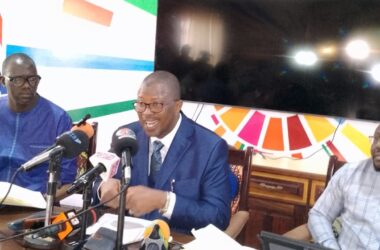
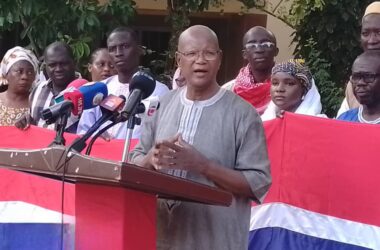
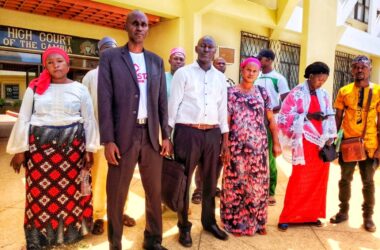
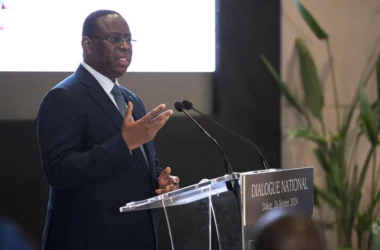
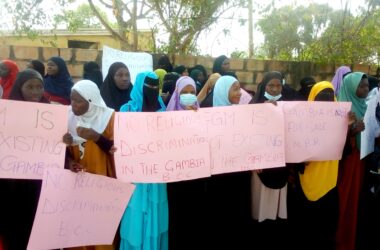
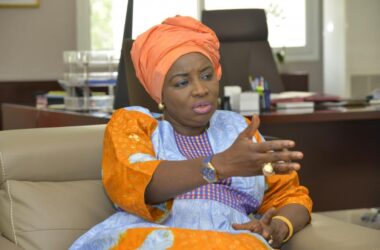


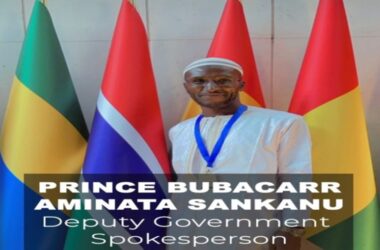


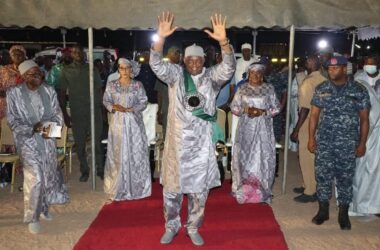

D. A. Jawo for President!